|
De Nederlandse dichter en schrijver Michel van der Plas werd geboren op 23 oktober 1927 in Den Haag. Zie ook mijn blog van 23 oktober 2010 en eveneens alle tags voor Michel van der Plas op dit blog.
Een middag lang naar elkaar liggen kijken
Een middag lang naar elkaar liggen kijken
met niets dan liefde aan. Zijn wat je hebt:
stilte die een schouder voor stilte schept,
lippen en handen die adem aanreiken.
Even soms huiveren, niet van gedachten,
maar van verlangen dat zichzelf niet kent:
een kind van aarde. Hebben wat je bent:
trage honger, klein niemandsland van wachten.
Werkelijkheid proeft aarzelend van droom:
beiden komen tot nieuw verwisseld leven;
vraagtekens die elkander antwoord geven,
buigende oevers van eenzelfde stroom:
de eeuwigheid tussen ons in geschoven.
Dat wij dat zijn, het is niet te geloven.
Eerste liefde
Zeventien. – ’s Avonds viel voor ’t eerst een ster
voor je venster in drie wensen uiteen:
schittertranen op een wereld van steen.
Maak me mooi. Laat me beven. Breng me ver.
En de dagen werden opeens een strand
om blootsvoets op te dansen. Nergens kon
een rok wijder staan dan jouw horizon,
en de appel zon trilde in je hand.
Maar je stelde de beet wervelend uit
voor het reiken naar lucht, vluchten van grond.
Ogen had je en benen; nog geen mond.
Adem was je en dorst; nog geen besluit.
De zee en één duin maar hebben je zien
uitduizelen: vogelvrij zeventien
Een dagje weg
Vannacht heb ik gedroomd dat je heel even
een dagje weg mocht van je plaats: hierheen,
de wereld in. Eerst zat je nog te beven
aan tafel, in de kring, vel over been,
maar toen al gauw heel rustig; en er scheen
geel licht alom, en je zat blij te leven
met ons, o, zo heel eigen en zo een
met al dat roerloos wederkerig geven.
We zeiden niets, bang dat er iets zou breken
of dat je tijd, wanneer wij zouden spreken,
weer om was; maar het teerste was je lach
op het albast van je gezicht: ik zag,
met tranen in mijn ogen, daar het teken
dat dit huis je geluk was, deze dag.
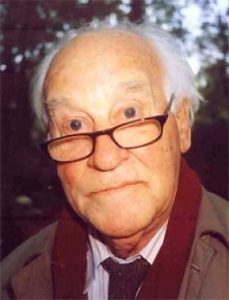
Michel van der Plas (23 oktober 1927 -21 juli 2013)
De Albanees-Amerikaanse schrijfster en actrice Masiela Lusha werd geboren op 23 oktober 1985 in Tirana. Zie ook mijn blog van 23 oktober 2010 en eveneens alle tags voor Masiela Lusha op dit blog.
Call Us Women
All you men...
What lies in your fists?
In your eyes,
Tongue,
& Mind?
Your packs of gods
Offer drops of life,
& we women
Carry it,
Bake it
& endure it
Until it becomes
A seed of heaven,
Which we fed with our mouth,
Caressed with our blood,
& heard its bubbling songs
of life
Through our skin.
Your bellies,
Which lounge gods of Men,
Of changing passion
& rage,
Can never churn
The weight of a shell
Into a breathing being as powerful
As yourself.
It was bestowed upon us,
Because to be a man
Is to convey strenght,
But to be a woman,
Is to foster
& convey this and more
On a separate measure and ourselves,
& at times, on you.
So, call us women,
& remember who we are.

Masiela Lusha (Tirana, 23 oktober 1985)
De Amerikaanse schrijver Augusten Xon Burroughs werd geboren op 23 oktober 1965 in Pittsburgh, Pennsylvania. Zie ook mijn blog van 23 oktober 2010 en eveneens alle tags voor Augusten Burroughs op dit blog.
Uit: Dry
“Behind the bar, the wall is paneled in this same wood, inlaid with tall etched mirrors. Next to the mirrors are dull brass light fixtures with stained-glass shades. No bulb in the place is above twenty-five watts. In the rear, there are nice tall wooden booths and oil paintings of English bird dogs and anonymous grandfathers posed in burgundy leather wing chairs. They serve a kind of food here: chicken-fried steak, fish and chips, cheeseburgers and a very lame salad that features iceberg lettuce and croutons from a box. I could live here. As if I didn't already.
Even though I'm five minutes early, Jim's sitting at the bar and already halfway through a martini.
"What a (expletive) lush," I say. "How long have you been here?"
"I was thirsty. About a minute."
He appears to be eyeing a woman who is sitting alone at a table near the jukebox. She wears khaki slacks, a pink-and-white striped oxford cloth shirt and white Reeboks. I instantly peg her as an off-duty nurse. "She's not your type," I say.
He gives me this how- the-hell-do-you-know look. "And why not?"
"Look at what she's drinking. Coffee."
He grimaces, looks away from her and takes another sip of his drink.
"Look, I can't stay out late tonight because I have to be at the Met tomorrow morning at nine."
"The Met?" he asks incredulously. "Why the Met?"
I roll my eyes, wag my finger in the air to get the bartender's attention. "My client Faberge is creating a new perfume and they want the ad agency to join them tomorrow morning and see the Faberge egg exhibit as inspiration." I order a Ketel One martini, straight up with an olive. They use the tiny green olives here; I like that. I despise the big fat olives. They take up too much space in the glass.”
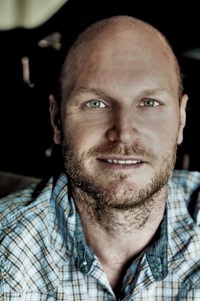
Augusten Burroughs (Pittsburgh, 23 oktober 1965)
De Engelse dichter, toneel- en prozaschrijver Robert Seymour Bridges werd geboren in Walmer, Kent, op 23 oktober 1844. Zie ook mijn blog van 23 oktober 2009 en ook mijn blog van 23 oktober 2010
London Snow
When men were all asleep the snow came flying,
In large white flakes falling on the city brown,
Stealthily and perpetually settling and loosely lying,
Hushing the latest traffic of the drowsy town;
Deadening, muffling, stifling its murmurs failing;
Lazily and incessantly floating down and down:
Silently sifting and veiling road, roof and railing;
Hiding difference, making unevenness even,
Into angles and crevices softly drifting and sailing.
All night it fell, and when full inches seven
It lay in the depth of its uncompacted lightness,
The clouds blew off from a high and frosty heaven;
And all woke earlier for the unaccustomed brightness
Of the winter dawning, the strange unheavenly glare:
The eye marvelled-marvelled at the dazzling whiteness;
The ear hearkened to the stillness of the solemn air;
No sound of wheel rumbling nor of foot falling,
And the busy morning cries came thin and spare.
Then boys I heard, as they went to school, calling,
They gathered up the crystal manna to freeze
Their tongues with tasting, their hands with snowballing;
Or rioted in a drift, plunging up to the knees;
Or peering up from under the white-mossed wonder,
'O look at the trees!' they cried, 'O look at the trees!'
With lessened load a few carts creak and blunder,
Following along the white deserted way,
A country company long dispersed asunder:
When now already the sun, in pale display
Standing by Paul's high dome, spread forth below
His sparkling beams, and awoke the stir of the day.
For now doors open, and war is waged with the snow;
And trains of sombre men, past tale of number,
Tread long brown paths, as toward their toil they go:
But even for them awhile no cares encumber
Their minds diverted; the daily word is unspoken,
The daily thoughts of labour and sorrow slumber
At the sight of the beauty that greets them,
for the charm they have broken.
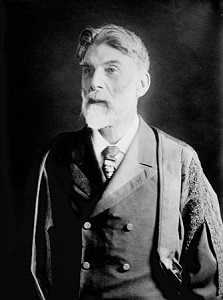
Robert Bridges (23 oktober 1844 - 21 april 1930)
De Oostenrijkse schrijver Adalbert Stifter werd geboren in Oberplan op 23 oktober 1805. Zie ook mijn blog van 23 oktober 2010 en eveneens alle tags voor Adalbert Stifter dit blog.
Uit: Die drei Schmiede ihres Schicksals
„Es war in einer Gesellschaft lustiger Männer ein Streit über den altlateinischen Satz ausgebrochen, daß jeder Mensch der Schmied seines Schicksals sei. Einige behaupteten, der Satz wäre echt römisch, und stehe gewiß in diesem oder jenem Werke dieses oder jenes Klassikers; andere sagten, er sei ein neues Machwerk, und schleppe sich erst seit kurzer Zeit durch unsere lateinischen Schulbücher. Aber wie es geht, von diesem rein historischen Standpunkte, über den sie sich nicht einigen konnten, spielte sich der Streit auf den philosophischen über und entbrannte nun auf das heftigste über die Frage, ob es auch wahr sei, was der Satz enthalte. Man führte nun nicht mehr bloß die Historie in das Feld, sondern suchte der Sache auch a priori beizukommen, indem man die Psychologie, die Logik und Metaphysik aufbot. Man redete über Zusammenhang der Dinge, sittliche Weltordnung, Emanzipation vom Zufalle, Freiheit des Willens, und war auf dem Wege, ins Endlose zu geraten, als plötzlich ein Schalk, der bisher geschwiegen hatte, eine Geschichte zu erzählen anfing, worauf es nach und nach stille ward; denn beide Parteien horchten hin, in der Hoffnung, Gründe für ihre Behauptung aus der Geschichte ziehen zu können. Allein der Mann zog seine Geschichte gerade bis zu dem Punkte, wo sie sich spalten mußte, um der einen oder der andern Partei zu dienen – dann brach er ab und sagte, daß er den Rest morgen erzählen wolle, wenn sie etwa wieder zusammen kämen. Sofort erhob sich ein Lärm über Willkür und Täuschung, und man verlangte, daß er fortfahre. Aber da er hartnäckig bei seinem Ausspruche blieb, so vertagten sie listig den Streit, weil jeder begierig war, wie es nun weiter gehen werde, und weil jeder heimlich hoffte, ihm würden die Hilfstruppen aus der Sache zuwachsen."
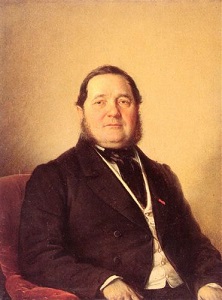
Adalbert Stifter (23 oktober 1805 - 28 januari 1868)
Portret door Josef Grandauer, 1862
De Amerikaanse dichter, schrijver en journalist Nick Tosches werd geboren in 1949 in Newark, New Jersey. Zie ook alle tags voor Nick Tosches op dit blog en ook mijn blog van 23 oktober 2009 en ook mijn blog van 23 oktober 2010
Uit: Under Tiberius
“Some years ago, in the spring of 2000, I was spending my days in the Vatican, studying several unique manuscripts in the course of my research for a novel.
Access to these manuscripts required high academic credentials. I had none. But in the end, after several meetings and interviews that seemed at times to be interrogations, the Vatican Library had given me identification cards authorizing the access I needed to both the Archivio Segreto and the Biblioteca Apostolica Vaticana. These cards, which bore the seal of the Vatican, attested that the Vatican had bestowed an honorary doctorate on me.
I was under constant supervision, or surveillance, during the days of my research. But I was very fortunate that the guardian who had been appointed me was a kindly old prelate who was more devoted to librarianship and learning than to the Head Librarian in the Sky and the recondite hierarchical ambitions of the Vatican, all of which he seemed to have waved away long ago.
One afternoon, as we walked toward a destination in the vast underground maze of one great chamber that on this day was eerily deserted and silent, we passed a long, high wall of partitioned shelf upon partitioned shelf of strapped-shut leather tubes that cast a soft penumbral patinated glow in the dim lighting from the vaulted ceiling above them.
The old prelate and I upon first meeting had begun our brief, tentative conversational exchanges in Italian. Slowly, by interjecting phrases of English into our talk, he let it be known that his English was more fluent than my Italian. And so, after a few days, we spoke almost exclusively in English.
“What are these?” I asked, gesturing to the leathern tubes that seemed to be countless in their dark wooden places of rest in the wall that seemed to be endless. I was sure that they were papyrus scrolls.
Very, very ancient scrolls, as the leather cases that held them were ancient themselves, and the wood of the shelves appeared to have been there for centuries.“
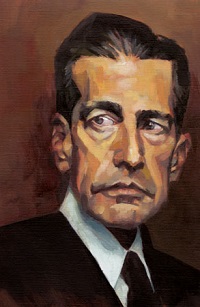
Nick Tosches (Newark, 1949)
Portret door Raphaël Gauthey, 2009
Zie voor nog meer schrijvers van de 23e oktober ook mijn blog van 24 oktober 2011 deel 1 en eveneens deel 2.
23-10-2015 om 18:24
geschreven door Romenu 
Tags:Michel van der Plas, Masiela Lusha, Augusten Burroughs, Robert Bridges, Adalbert Stifter, Nick Tosches, Romenu
|

